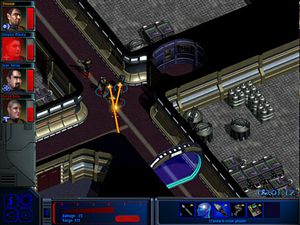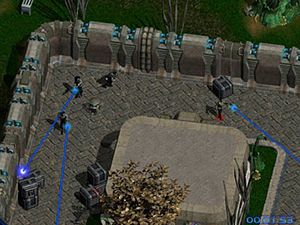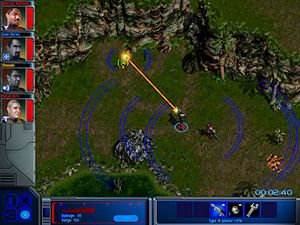Incursion excursion.
Games—the final frontier? These are the voyages of the Star Trek enterprise:
To explore strange new media forms; to seek out new life and new franchises; to
boldly go where no fan has gone before.
In gimpy little fits and hops, with an uneven success rate, Star Trek games
have been, on the whole, improving and reaching out in new and largely successful
directions just lately. Armada, Star
Fleet Command 2, Elite Force
– each took on new gameplay styles and did well, each of them shining in its
own way.
Star Trek: Away Team is Trek’s attempt to woo fans of Commandos-style,
squad-based stealth strategy, and while it embraces the genre lustily, its haste
and awkwardness leaves gamers with a rather sticky mess, a sense of unfulfillment
and really bad metaphors.
Players assume command of a super-secret squad of Federation commandos assigned
to the Incursion, a holographically-disguised stealth starship which can assume
the looks of other ships. It can therefore get into various political/military
hot zones, beam down a crack squad of plausible deniability, and kick, phaser
or nerve-pinch just the right butts in what are sometimes less-than-totally-Federation-like
operations. It’s a great idea, since the Trek universe is sometimes a little
too clean and goody-goody.
In a story-driven series of missions, players assemble two- to six-man landing
parties (excuse me, away teams, darn my Classic Trek proclivities!) to elude,
fight and otherwise thwart Klingon, Romulan, Borg and even brainwashed-Federation
forces. Superficially, it’s very Commandos.
The environments are huge and highly-detailed. Planet-surface military encampments,
tangles of starship corridors and staterooms, shot-up shuttle bays, even the
sparkling, techutopian campuses of Star Fleet Command give the eye a lot to
look at, and in theory, the characters much to do. Guards walk their patrols,
security cameras make their vigilant sweeps, proximity mines await the incautious
explorer, shipboard computers yield their precious data stores and the bodies
(and possessions) of the fallen litter the ground after a phaser firefight.
There are two things you’ll spend the majority of your time doing: skulking
and shooting. A failure of the former generally leads to a whole lot more of
the latter, suddenly and at the worst possible moment. Away Team uses
the now-obligatory ‘sight cone,’ a visual indicator of just what areas an enemy
can see at any given time. However, it also introduces an audio marker, a sort
of graphical representation of just how much noise a particular squad-member
is making as he/she walks, crouches, runs, shoots, screams, whatever. It’s a
nice touch, and allows a nifty piece of equipment that can actually throw a
false audio footprint like some high-tech ventriloquist. If you’re unsure about
the bewildering level of detail around you, you can just whip out the tricorder
and ‘scan’ every last object – maybe you’ll learn it’s the computer terminal
you need to access, or maybe you’ll learn some of the botanical facts about
some of the weirder bits of flora near your beam-down site. At any rate, it’s
a cute toy.
In theory, you want to conduct your away team like the United Federation of
Ninjas: creeping silently behind guards and nerve-pinching them, getting single-round
head-shot kills with the sniper rifle, taking out guards non-lethally with phasers
set to stun, etc. Still, you are free to bust out with the concussion grenades
or plant remotely-detonated antipersonnel mines in tight corridors, or just
roll up on an enemy en masse and beddy-bye him with a hypo full of narcotics.
It sounds kind of dark, but it’s all pretty harmless, especially with so much
of the voice-work and mission briefings containing the high levels of cheese
and smarm that they do (performances by Michael Dorn and Brent Spiner excepted,
of course).
 What
What
is not harmless is that this potentially super-cool game scheme is marred
by flaws that are large in number, oft-inexplicable, confounding or just plain
sad. Something in the food or water on the Incursion has turned your crack squad
of savvy, motivated personnel into zen combat-retards who will not return fire,
defend themselves or react in any way (aside from bitching at you about getting
hit) once they fall under attack. The game will auto-pause if one of your guys
or gals is shot offscreen, but that one shot may be the straw that cracked the
camel’s antimatter core, since there is no way to set behaviors, as in similar
games.
Your team members are also incapable of trading items between themselves. They’re kind of dull and easy to take for granted, since they recover all health between missions and any sense of drama or tension that they might not make it through the campaign is MIA. And frankly, the massively-detailed levels kind of grate on the nerves since they’re more like scripted try-and-die puzzles than actual open-ended tactical challenges. Thus, the game feels even more linear than it already is (and that’s a bummer, because with this level of detail, one instinctively wants to go exploring).
Perhaps the worst thing is that if you lose even one team member (even if
it’s just the guy packing the medical hypos nobody needs), it reads to the game
like a mission failure. So much for the Sacrificial Fed approach.
Some Trek games are great, some are bad, some are okay. This one’s okay, if
you just get into the excellent mood, the environmental detail and the strategic
puzzle-solving of it all. If you try to get too rogue or off the beaten path,
however, you’ll end up phasering yourself in the foot. This is less ‘black ops’
than ‘slighty off-white’ ops; let’s hope it serves as a frontier beacon for
the next few scouts that probe out this way.

-
Good visuals and audio
-
Grenades!
-
Detailed, scannable environments
-
Vision/audio stealth schemes
-
Would somebody please defend himself?
-
Not as 'black ops' as touted
-
More puzzle than strategy gameplay
-
No real sense of coherent campaign











